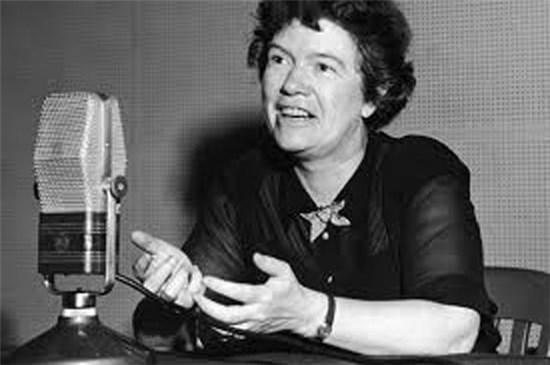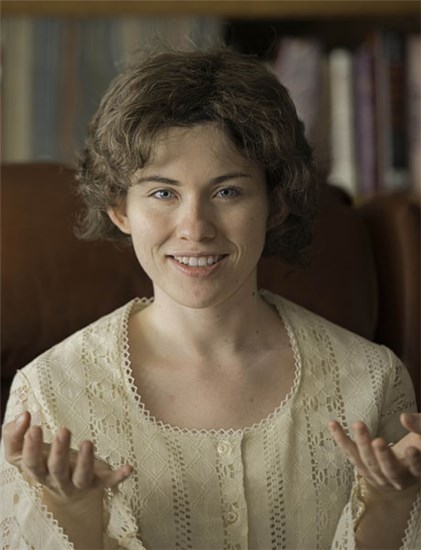

MARGARET MEAD (1901-1978)
by Amelia (Newport) Wagner
Sponsored by the Kenneth G. and Myra Monfort Charitable Foundation
“There’s no one like Margaret.” These words were first uttered by Margaret Mead’s parents, Edward and Emily Mead. Although the Mead household held five children, there was no doubt something special about the family’s first- born. Outgoing, vivacious, and stubborn, the young Margaret Mead saw life as an adventure and she was determined to experience it all. Perhaps the greatest gift the Meads gave their daughter was the ability to delight in the world and the people around her. Of her childhood, Mead later remarked, “I learned to observe the world around me and to note what I saw.”
This valuable skill would serve Mead well in her career as an anthropologist. In 1924, she earned her Master’s degree from Columbia University. A year later, she began the job that would later bring her global attention – field work among the young women of Samoa. The resulting book, Coming of Age in Samoa, took the United States by storm. The book’s groundbreaking anthropological work challenged the longstanding notion of a culturally universal maturation process among adolescents.
Mead’s work later resonated with a generation seeking to come to terms with life after two world wars. The United States could not be an island unto itself. Globalization had engulfed the country, bringing a myriad of religious, political, and social ideas. Tension between the old and the new manifested in various forms of social unrest, such as women’s liberation, the Civil Rights movement, and anti-war protests. Yet unlike many of her generation, Mead embraced the coming changes.
Mead’s unwavering advocacy for social change, and her unabashed discussion of sensitive and taboo topics, did not always earn her fans. Coming of Age in Samoa was labeled a “sex book” by some of Mead’s peers and the Governor of Florida called Mead “a dirty old lady” for her support of the decriminalization of marijuana. If anything, her critics only spurred her on. Whether facing a hostile tribe member in New Guinea or a hostile peer in the United States, Mead thrived on challenges.
Even to the end, Mead was indefatigable. “Sooner or later I’m going to die,” she was known to have admitted. “But I’m not going to retire.” At the age of 74, Mead took a trip to visit the Manus people of Papua, New Guinea. Mead had begun her work with the Manus in 1929 and her many trips to visit them had provided one of the first anthropological studies that spanned generations of the same people. The trip was to be one of her last. Shortly after her return to the States, Mead was diagnosed with pancreatic cancer. The disease moved quickly and in 1978, she passed away.
The nation mourned the death of this woman, who had almost single handedly changed the field of anthropology. A year after her death, President Jimmy Carter awarded Mead the Presidential Medal of Freedom for her work. Driven and compassionate, stubborn and unyielding, beloved and hated – there was indeed no one like Margaret.
RECOMMENDED READING
Cassidy, Robert. Margaret Mead: A Voice for the Century. New York: Universe Books, 1982.
Foerstel, Leonara, and Angela Gilliam, eds. Margaret Mead's Contradictory Legacy. Philadelphia: Temple University Press, 1992.
Howard, Jane. Margaret Mead. New York: Simon and Schuster, 1984.
Mead, Margaret. Coming of Age in Samoa. New York: William Morrow, 1961.
Mead, Margaret. Blackberry Winter. New York: William Morrow, 1972; Pocket Books, 1975.
AMELIA (NEWPORT) WAGNER
Amelia (Newport) Wagner began her career as a Chautauquan at the age of 12 when she joined the Colorado Humanities Young Chautauqua program in Greeley, Colorado. Amelia was one of the first Young Chautauquans to perform on the High Plains Chautauqua main stage in 2005. She later returned to the main stage in 2008, portraying Anna Howard Shaw. She graduated from the University of Denver in 2012 with a Bachelor’s Degree in English and History. The historical research Amelia conducted at school caught the attention of the Council for Undergraduate Research and in the spring of 2012, she was invited to present her thesis at a conference before members of Congress. Amelia was a first-person living history interpreter for the Denver Museum of Nature and Science’s Pompeii exhibit, which concluded in January 2013. She is very happy to be at High Plains Chautauqua once more.
MARGARET MEAD
- Mead began her first field work in 1925, studying adolescent girls in Samoa. Her findings were later published in her book, Coming of Age in Samoa.
- Mead traveled to New Guinea in 1929 to study the Manus people. She returned to the Manus frequently in her later years, enabling her to complete the first anthropological study spanning generations.
- Mead began writing articles for Redbook magazine on a variety of topics in 1961. Her strongly expressed and often controversial opinions made her a household name.
- Mead was posthumously awarded the Presidential Medal of Freedom in 1979 for her work in the field of anthropology.
QUOTES
“Never believe that a few caring people can’t change the world. For, indeed, that’s all who ever have.” – Margaret Mead
“I was wise enough to never grow up while fooling most people into believing I had.” – Margaret Mead
“We are now at a point where we must educate our children in what no one knew yesterday, and prepare our schools for what no one knows yet.” – Margaret Mead
“I must admit that I personally measure success in terms of the contributions an individual makes to her or his fellow human beings.” – Margaret Mead
“Margaret Mead was both a student of civilization and an exemplar of it. To a public of millions, she brought the central insight of cultural anthropology: that varying cultural patterns express an underlying human unity. She mastered her discipline, but she also transcended it. Intrepid, independent, plain-spoken, fearless, she remains a model for the young and a teacher from whom all may learn.” – President Jimmy Carter
TIMELINE
1901 Margaret Mead is born December 16.
1924 Mead graduates with her Master’s Degree from Columbia University.
1925 Mead begins her first field work, studying adolescent girls in Samoa.
1926 Mead is appointed assistant curator of ethnology at the American Museum of Natural History.
1928 Coming of Age in Samoa is published.
1929 Mead travels to New Guinea to study the Manus people.
1939 Mead’s only child, Mary Catherine Bateson, is born December 28.
1961 Mead begins writing for Redbook magazine.
1975 Mead returns to study the Manus for the last time.
1978 Margaret Mead dies November 15.
1979 Mead is posthumously awarded the “Presidential Medal of Freedom” on January 19.